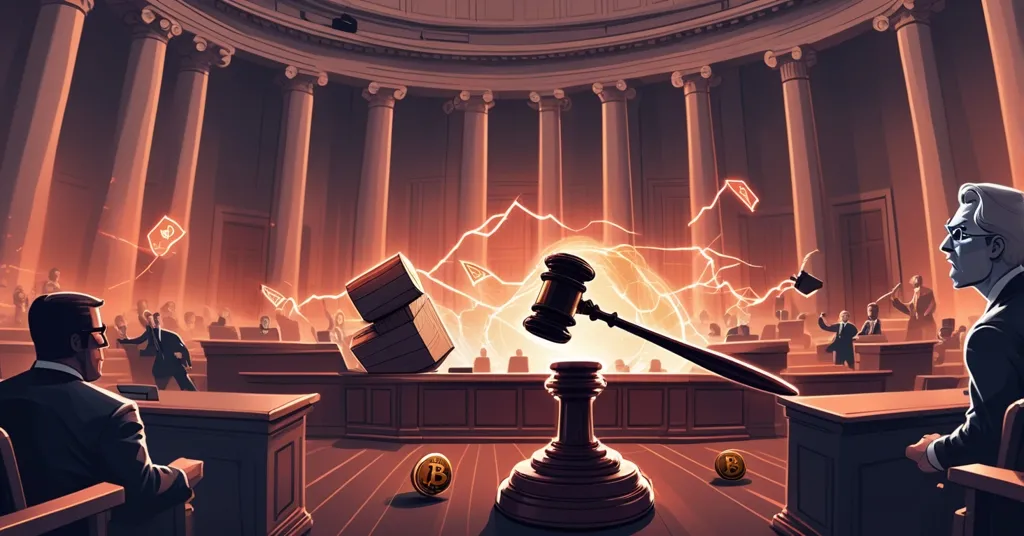Judge Blocks FTC Probe into Media Matters Over X Ad Controversy

Judge Halts FTC Probe into Media Matters Amid X Advertising Clash
A federal judge has slammed the brakes on a Federal Trade Commission (FTC) investigation targeting Media Matters, a left-leaning watchdog group, after its 2023 report exposed ads from major brands running alongside antisemitic and hateful content on X, Elon Musk’s social media platform. This ruling, grounded in First Amendment protections, throws a spotlight on government overreach, digital freedom, and the ugly power struggles brewing in today’s tech landscape.
- FTC investigation into Media Matters blocked by Judge Sparkle L. Sooknanan for violating free speech rights.
- X’s aggressive lawsuits against critics and advertisers lead to layoffs and program shutdowns.
- Political undertones surface with Trump-era FTC leadership driving the probe.
The Spark That Ignited the Firestorm
Back in 2023, Media Matters dropped a report that hit X like a freight train. Their findings showed advertisements from big-name brands—think household giants—placed right next to vile, antisemitic posts and other objectionable content on the platform. For context, “objectionable content” here often means hate speech, misinformation, or extremist material that violates basic decency, something X has been criticized for failing to moderate since Musk’s takeover in 2022. The fallout was immediate and brutal: advertisers pulled their spending faster than a crypto exchange locking accounts during a hack panic. Reports suggest X lost tens of millions in ad revenue by late 2023, a gut punch to a platform already struggling with trust issues among corporate partners, as discussed in various online forums like this community thread on X’s advertiser pullback.
Musk didn’t take this lying down. X fired back with lawsuits against Media Matters and several advertisers, accusing them of orchestrating a “systematic illegal boycott” to tank the platform’s finances. It’s a high-stakes showdown—X fighting for survival against critics wielding the power of exposure and corporate wallets. But this isn’t just about one report or one platform; it’s a battle over who controls narratives in digital spaces, a theme that resonates deeply with anyone rooting for decentralization over centralized gatekeepers, much like Bitcoin’s rebellion against traditional finance.
FTC Steps In—Or Oversteps?
Fast forward to May 2025, and the plot thickens. Under new leadership following Donald Trump’s return to the White House, the FTC launched a probe into Media Matters. The agency wanted to know if the group illegally coordinated with advertisers to influence their pullback from X, demanding records and communications in a sweeping move. Leading the charge is FTC Chair Andrew Ferguson, whose past remarks on a podcast with Steve Bannon about targeting progressive groups raised red flags about political motives. This wasn’t just an investigation; to many, it stank of retaliation against a vocal critic of a platform aligned with certain political leanings, as explored in this detailed report on the FTC’s actions.
Enter U.S. District Judge Sparkle L. Sooknanan, who on Friday issued a temporary order shutting down the FTC’s inquiry. Her reasoning was crystal clear: Media Matters’ reporting is “quintessential First Amendment activity,” and the FTC’s “expansive” demands were nothing short of a “retaliatory act.” She didn’t hold back on the broader implications either, as highlighted in this analysis of Judge Sooknanan’s ruling:
“It should alarm all Americans when the Government retaliates against individuals or organizations for engaging in constitutionally protected public debate. And that alarm should ring even louder when the Government retaliates against those engaged in newsgathering and reporting.”
She also pointed to a chilling effect—meaning the fear of punishment that stops people from speaking out. Media Matters even admitted to avoiding stories tied to the FTC, Ferguson, or Musk due to this pressure. If that’s not a gut check for anyone who values free expression, what is? For those of us in the Bitcoin and blockchain camp, this hits close to home. It mirrors how regulatory overreach can silence crypto projects or throttle innovation through fear, just as banks blacklist DeFi startups they can’t control.
X’s Legal Hammer and Collateral Damage
Musk’s counterattack hasn’t just been loud—it’s been devastating. X’s lawsuits, alongside state-level investigations in Texas and Missouri (also halted by federal courts), have crushed Media Matters operationally. The group has laid off staff, with one researcher now running for Congress amid the chaos, and is burning millions on legal defense against what their lawyers call “harassment” from X’s discovery demands. Media Matters President Angelo Carusone framed the court’s injunction as a stand against Trump administration intimidation, a test of whether the judiciary can shield media and nonprofits from power abuses.
The ripple effects extend beyond Media Matters. X also filed an antitrust lawsuit in a Texas court against the World Federation of Advertisers (WFA) and its Global Alliance for Responsible Media (GARM) initiative, naming participants like Unilever, Mars, CVS, and Ørsted. GARM, focused on brand safety, aimed to ensure ads didn’t fund harmful content—a mission now dead in the water. Under legal and financial pressure, WFA discontinued the program, as covered in recent updates on X’s lawsuit against WFA and GARM. Their CEO, Stephan Loerke, stood firm on their position:
“The decision to discontinue GARM activities was not made lightly,” emphasizing that GARM is a nonprofit with limited resources, but they are confident the case will “demonstrate our full adherence to competition rules in all our activities.”
Here’s the kicker: Musk’s legal strategy raises serious questions. X consistently files in Texas courts, often under judges like Reed O’Connor, who recently recused himself from the WFA case due to owning stock in Tesla and Unilever—a glaring conflict of interest. Now reassigned to Judge Kinkeade, the case fuels accusations of forum-shopping, or picking courts likely to favor your side, much like choosing a referee who might tilt the game your way. On the flip side, some advertisers argue Musk is deflecting blame. They claim X’s own missteps—controversial content policies alienating users and brands—are the real revenue killers, not Media Matters or GARM. Is Musk a defender of free expression or just a sore loser swinging legal haymakers like a crypto bro hyping a trash memecoin?
A Broader Crackdown and Digital Freedom’s Stakes
This isn’t an isolated skirmish. The FTC is probing roughly a dozen other advertising and advocacy groups for potential antitrust violations tied to coordinated boycotts, suggesting a systemic crackdown on perceived anti-conservative agendas. It’s a power play that could reshape how criticism and financial pressure unfold online, with some questioning the broader implications of the FTC probe on free speech. Advertising boycotts, as Judge Sooknanan noted, can act as de facto censorship, much like how traditional finance chokes out blockchain projects it deems risky. Platforms like X are battlegrounds for free expression, and government probes or corporate pullbacks can muzzle voices just as effectively as a direct ban, a concern echoed in this analysis of X’s lawsuits and digital freedom.
For Bitcoin maximalists and decentralization advocates, there’s a rebellious charm to Musk’s pushback against coordinated corporate pressure. It echoes crypto’s fight against centralized control—think banks refusing to service Bitcoin exchanges or regulators burying DeFi under red tape. But let’s not drink the Kool-Aid blindly. Musk’s courtroom strong-arming can smell like centralized control in disguise, especially if he’s gaming the system for favorable rulings. Power, whether wielded by billionaires, governments, or ad agencies, can distort the freedoms we champion. If the FTC can muzzle critics of X, what’s stopping them from suffocating Bitcoin startups with endless audits or baseless probes, a topic explored in this report on the FTC inquiry halt?
Looking Ahead: A Fragile Balance
Judge Sooknanan’s ruling is a win for press freedom, no question. But the chilling effect is already real—critics are self-censoring, and legal warfare is grinding down smaller players. What happens if the FTC appeals and wins? Could this set a precedent for targeting any entity that dares critique powerful platforms or industries? And for platforms like X, could Musk pivot to blockchain-based solutions for ad transparency—say, tokenized systems to prove content safety—as a middle finger to regulators and advertisers alike? It’s a long shot, but in the spirit of effective accelerationism, why not push for tech that disrupts the status quo?
Parallels to the crypto world are stark. Just as DeFi projects face “boycotts” from traditional finance, X is battling financial exclusion by advertisers. Just as the SEC overreaches on blockchain innovation, the FTC’s actions here threaten digital dialogue. Historically, government overreach in tech—from early internet censorship attempts to crypto trading bans—shows this isn’t new. It’s a recurring fight for liberty in digital spaces, whether it’s tweets or transactions, much like the ongoing concerns about government overreach in the Media Matters case. As we cheer for disruption in tech and finance, unchecked power from any side can strangle the principles Bitcoin and platforms like X claim to defend. How do we strike the balance between holding bad actors accountable and preserving the raw, messy freedom of decentralized systems?
Key Takeaways and Burning Questions
- What sparked the conflict between X and Media Matters?
Media Matters’ 2023 report revealed major brand ads next to antisemitic content on X, triggering a massive advertiser pullback and X’s retaliatory lawsuits. - Why did the FTC target Media Matters, and why was it stopped?
Starting in May 2025 under Trump-era leadership, the FTC probed Media Matters for potential coordination with advertisers, but Judge Sooknanan halted it as a retaliatory act violating First Amendment rights. - How do X’s legal battles tie into the ethos of decentralization?
X’s resistance to advertiser and government pressure mirrors crypto’s fight against centralized gatekeepers, but Musk’s aggressive tactics risk mimicking the control he claims to oppose. - Is government overreach a growing threat to digital platforms and crypto?
Yes—the FTC’s wider probes into advocacy groups signal a pattern of targeting critics, which could suppress open dialogue on platforms like X and hinder Bitcoin adoption through regulatory fear. - Can blockchain principles help platforms like X resist centralized pressure?
Potentially—blockchain-based ad transparency or tokenized monetization could bypass traditional ad gatekeepers, offering X a way to prove content safety and defy regulatory overreach, much like Bitcoin sidesteps banks.



